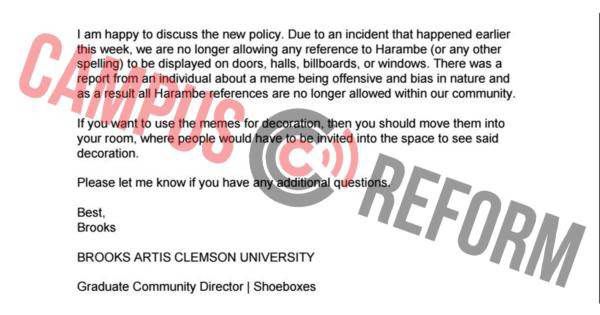As citizens of this amazing country, most of us are aware of the many freedoms that we possess. I, unfortunately, can now only believe that a certain number of members of our society possess this knowledge due to an issue on Clemson’s campus that I recently became aware of.
A Clemson University administrator, Brooks Artis, announced the restrictions that she would be implementing on the use and representation of the gorilla turned internet phenomenon, Harambe. Now, if you are reading the same thing I am, then you are completely and immediately confused by this new “rule.”
Below is a picture from campusreform.org of what Artis states her residents should follow.
Artis’ justification of this rule is as confusing as the rule itself. It turns out that Harambe is no longer the beloved gorilla of the Cincinnati Zoo that we tragically lost this summer, he is now seen as the face of racism and rape culture. No need to go back, you read all of that correctly.
Artis claims that, due to an event that occurred recently on campus, Harambe can be seen as a trigger for many members on campus. Her email to her dorm residents says that they will, by no means, be allowed to hang any memorabilia of this animal around their halls. Instead, they must express their mourning inside the protection of their private, brick-walled rooms. Like I initially found myself, you too may be curious of the specific event that would trigger such emotions. Conveniently enough, we are not allowed to know that information.
There are several problems I find with this new system Artis wants to enforce. Let’s go back to those rights that I mentioned in my introduction. I would have to say that, naturally, my personal favorite would be the First Amendment. And as a citizen of this great country, you should absolutely and positively be aware of what this amendment stands for.
But don’t worry; I got Webster to help us out with a simple definition just in case you aren’t fully aware:
“Noun: 1. First Amendment- – an amendment to the Constitution of the United States guaranteeing the right of free expression; includes freedom of assembly and freedom of the press and freedom of religion and freedom of speech”
Is this restriction of expression not taking away everything that this right stands for? Is Artis not stripping her residents of their chances of expression? Is she not, blatantly, telling them that they do not actually have freedom of speech within the confines of their own living space? Hmmm, you tell me.
Now, do I agree with Artis’ request? It doesn’t matter. It is her right to express how she feels about the situation. Does she agree with the posters and memes of Harambe placed around her dorm’s hall? It doesn’t matter. It is her students’ rights to do so and no one can take those away.
I do not believe that Artis is focusing on the true issue at hand. She does not educate her students on Harambe and the characteristics of racism and rape that he now, somehow, encompasses. She does not educate these pupils on what may be triggering about this gorilla and does not suggest better ways to go about referencing him. Artis just tells the dorm members not to mention the animal because she said so. And we all know how well college freshmen love to follow authority. In my opinion, she should be using this as an opportunity to further the knowledge of race and rape awareness on campus, not view it as an opportunity to restrict her residents’ rights.
This email has gained Artis, and Clemson University, national publicity throughout the week. Phrased another way, this is placing our school in a bad light. As protests and sit-ins that have taken place around campus have proved, this university is one that welcomes freedom of speech. Not a community that limits it. Artis uses Clemson’s discriminatory language policies as the foundation for her argument, but these policies do not actually allow her the authority to punish anyone.
One cannot simultaneously express their own First Amendment rights while denying others the right to do the exact same thing. You do not have to listen to what someone has to say. But you do have to grant them the opportunity to say it.









